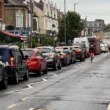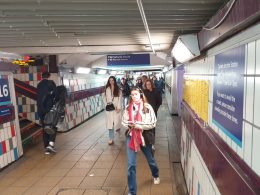Mark Justin opened Reform UK’s Wandsworth “Question Time” meeting last night with a personal story: His immigrant mother worked at the council for 24 years as ‘Janet the foreigner.’
‘I am the living embodiment of migrants who came to the UK,’ the borough’s first Reform councillor told 300 people packed into Le Gothique in the Royal Victoria Patriotic Building on Wandsworth Common.
Seconds later, when he asked panelists about Sadiq Khan’s chances of winning another mayoral term, GB News contributor Matt Goodwin bypassed the question entirely. Instead, he talked about mass immigration, Birmingham as a ‘no-go zone for British Jews,’ and claims about ‘rape gangs in our capital city.’
‘If you come into this country and rape our kids,’ Goodwin told the crowd, ‘you should be removed immediately.’
The audience’s reaction to both moments was polite but muted – no eruption of enthusiasm for Justin’s personal story, scattered agreement for Goodwin’s rhetoric, but nothing resembling the energy that came later when another panelist – Mark Littlewood – declared that ‘taking Westminster’ was the main prize.
It was the Conservative Party strategists on the panel – still Tory members attending to advise Reform – who identified what the energy in that room was missing: A coherent strategy.
‘You haven’t yet found the tactical awareness’ to break Labour’s grip on urban areas, historian David Starkey told the meeting Wednesday evening, using ‘you’ to describe Reform rather than ‘we.’
With Wandsworth council elections just six months away, and despite Justin’s best efforts as a local councillor, the panel’s dismissal of local organising in favour of Westminster dreams revealed a fundamental question about Reform UK: Is this a party being built from the ground up, or a movement chasing national headlines?
The energy is real
About 20 protesters gathered outside the Gothic revival venue before the event, distributing leaflets warning about Reform UK’s racism and Islamophobia, and raising concerns about NHS privatisation plans. Inside, the atmosphere was different from what they might have expected.
The crowd of around 300 skewed older and predominantly white, but roughly 20 percent appeared to be under 40 – younger than a typical political meeting. The glorious hall, with its purple lighting and Union Jack flags, was genuinely full on a Wednesday night. Something was building.
The evening’s biggest applause came not for any culture war rhetoric, but when a speaker emphasised the need to ‘take Westminster’ to achieve change. People wanted something radical. They just couldn’t agree on what that meant or how to get there.
Three competing visions
The panel revealed three fundamentally different approaches to building Reform as a political force.
The Conservative strategists’ warning
Starkey, who remains a Conservative Party member, delivered the evening’s most substantive political analysis. He explained that Sadiq Khan follows the Ken Livingstone playbook: building what he called a “rainbow coalition” that brings together “traditional Muslims on one hand and the extreme left on the other” – an approach that has proven to be a “winning inner city combination.”
Reform, he warned, hasn’t figured out how to “prise apart” this coalition or developed the tactical sophistication that established parties possess.
Mark Littlewood, director of the Popular Conservatism faction and former head of the Institute of Economic Affairs, reinforced this with a lecture on council realities. Local authorities are required to provide SEND schools and adult social care, he explained, and these services dominate council budgets. His advice: Don’t promise to fix councils by scrapping waste, get elected on that promise, then discover you can’t deliver anything – because voters will conclude you’re just like every other party.
The culture warrior’s revolution
Goodwin took a different view entirely. Reform should be “going to war with the British state,” he argued, ready to “reconfigure” and “rewire” everything. He claimed £50 billion could be saved through cutting “fraud and unnecessary contracts.”
Starkey interrupted, shaking his head: “But it’s pennies!” He warned against Reform positioning itself as DOGE – a reference to Elon Musk’s proposed Department of Government Efficiency in the United States. “Musk is probably the most intelligent person on the planet,” Starkey said, “but government is not like SpaceX or the Boring Company.”
The tension between the two became personal later in the evening when Starkey recounted mockingly suggesting Goodwin name his own political party ‘the White Shirts’ – an apparent reference to 1930s fascist Brown Shirts while emphasising race. The comment landed in awkward silence, crystallising the gulf between Goodwin’s revolutionary rhetoric and Starkey’s pragmatic warnings about political realities.
The councillor’s local focus
Justin, positioned between these two approaches, brought his questions back to Wandsworth issues: Why is traffic so bad over Putney Bridge following Hammersmith Bridge’s closure? What should be done about the illegal encampment opposite the US Embassy at Nine Elms? He urged attendees to get involved and put themselves forward as Reform candidates with the local elections just six months away.
But the panelists had other ideas. The UK is “the most centralised economy on the planet,” Littlewood told the crowd – a characteristic piece of hyperbole – with 95 percent of spending decisions made in Westminster.
“If you want to change the country, you have to take Westminster,” he said, urging Reform supporters to “always keep your eye on the main prize.” This was the line that generated the evening’s most sustained applause. Second was a call for the UK to leave the European Court of Human Rights (ECHR).
The six-month problem
The panel’s attitude toward local elections revealed something significant about Reform’s strategic thinking – or lack thereof.
With Wandsworth council elections scheduled for May 7, 2026 – six months away – the focus remained resolutely national.
For a party that currently has just one councillor in Wandsworth, this represents either supreme confidence or a fundamental misunderstanding of how political movements build power. Established parties know that council seats provide the infrastructure, data, and credibility needed to win parliamentary constituencies. They’re the foundation, not the distraction.
Starkey’s warning implicitly addressed this gap. His analysis of how Labour maintains urban control through coalition-building and tactical sophistication was, in essence, a lecture on why the slow work of local organising matters. But whether anyone took the point was unclear.
What the meeting revealed
The protesters outside weren’t wrong that Goodwin would deliver anti-immigration rhetoric. Their leaflets warning about racism and Islamophobia accurately predicted part of what would be said inside.
But the story was more complicated than that. The room’s muted response to Goodwin’s most inflammatory lines suggested this wasn’t a crowd energised by culture war politics.
What did resonate was the message of radical change and taking power. Three hundred people gave up a Thursday evening because they want the system blown up. Even Littlewood’s stated goal to get rid of the Metropolitan Police – several of whom were currently outside in the rain to ensure the protestors remained peaceful – got a smattering of approval. The problem Reform faces is that its platform offered three different instruction manuals for the demolition.
Energy without strategy isn’t sustainable. As attendees filed out past the Union Jacks in the converted church, the question hanging over Reform UK’s Wandsworth operation remained unanswered: Whether the enthusiasm in that room could be channeled into the unglamorous work of winning council seats, or whether the focus on ‘taking Westminster’ would leave the party without the foundations needed to get there.
May 7 will provide the first test of which vision prevails – if Reform takes it seriously enough to compete.











Many thanks Mr McC, a balanced and informative article.
It is heartening to read the overtly racist member of the panel drew scant audience support.
You’ve confirmed that we live in a super community.
Reform are making a huge mistake, in my view, by not taking local government seriously. For one thing, many MPs gained valuable experience of how politics works by serving as Councillors first. But perhaps more important, all of us of a certain age know what good Labour and Conservative governments look like (though sadly we do have to go back a few years to find them). But the only experience people will have of Reform in power come the next General Election will be their performance in the Councils where they have taken control. I gather Kent CC may not be far away from government intervention owing to alleged failures over the Fire and Rescue Service, for example. Of course it’s a mixed picture – last week I met George Finch, Leader of Warwickshire, and was impressed – but should there be a string of failed Reform councils where the ruling groups has fallen apart (already 10 of the 57 elected Reform Kent County Councillors no longer of the Reform whip after just six months) it will severely affect Reform’s national performance. At the end of the day, I think, what really did for the Conservatives last year and is doing for Labour now is not so much opposition to the political vision (if there be such a thing any more) but the impression of sheer incompetence, in contrast say to Thatcher or Blair. Unless Reform gets its local government act together that same millstone may sink its national prospects.
Reform are making a huge mistake, in my view, by not taking local government seriously. For one thing, many MPs gained valuable experience of how politics works by serving as Councillors first. But perhaps more important, all of us of a certain age know what good Labour and Conservative governments look like (though sadly we do have to go back a few years to find them). But the only experience people will have of Reform in power come the next General Election will be their performance in the Councils where they have taken control. I gather Kent CC may not be far away from government intervention owing to alleged failures over the Fire and Rescue Service, for example. Of course it’s a mixed picture – last week I met George Finch, Leader of Warwickshire, and was impressed – but should there be a string of failed Reform councils where the ruling groups has fallen apart (already 10 of the 57 elected Reform Kent County Councillors no longer have the Reform whip after just six months) it will severely affect Reform’s national performance. At the end of the day, I think, what really did for the Conservatives last year and is doing for Labour now is not so much opposition to the political vision (if there be such a thing any more) but the impression of sheer incompetence, in contrast say to Thatcher or Blair. Unless Reform gets its local government act together that same millstone may sink its national prospects.